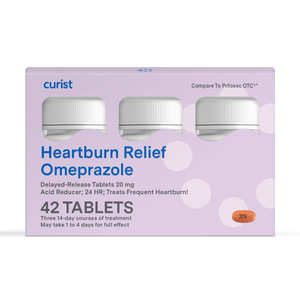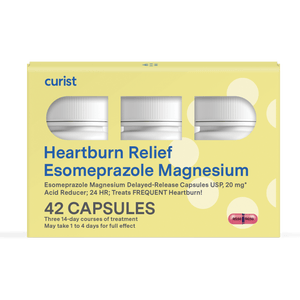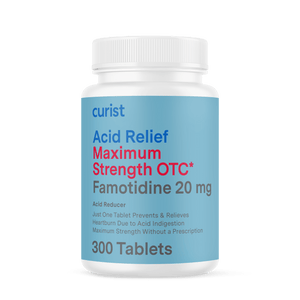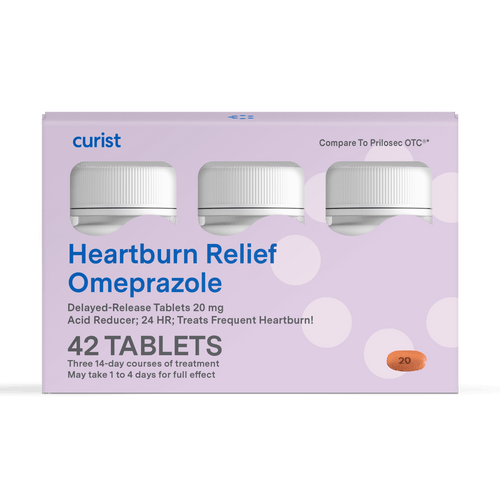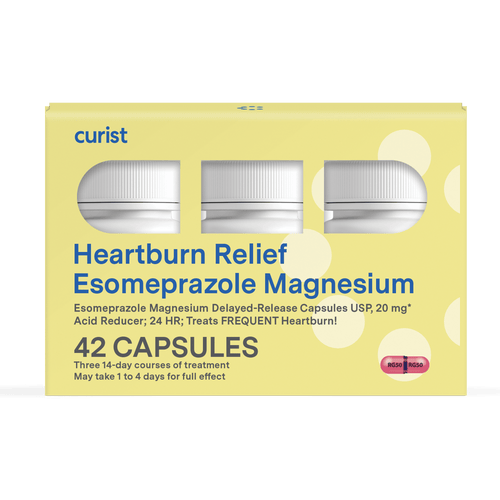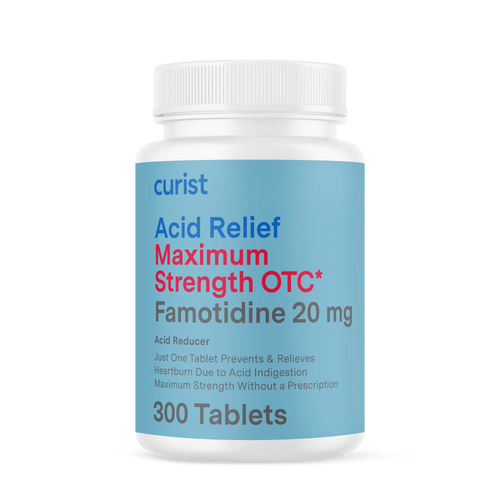Curist delivers over-the-counter medicines to your door at a fraction of the price of traditional brands. We hope everyone stays safe and healthy during this time.
If you suffer from occasional heartburn, do you find your symptoms sometimes kick in when you’re stressed or anxious - like during a job interview or right before your daughter’s wedding? While most of us associate symptoms of acid reflux with eating fried or spicy foods, there is evidence that stressful events can trigger it - but why?
The Stress-Heartburn Connection
Lifestyle factors can play a role in how heartburn affects an individual. A 2009 study published in the Scandinavian Journal of Gastroenterology looked at health surveys of 40,000 Norwegians. Researchers found that people who reported “severe, sustained work stress” could “significantly” predict increased heartburn symptoms. There were also connections to heartburn symptoms and low job satisfaction and exhaustion.
A more recent study, published in 2015 in the Internal Medicine Journal, interviewed about 13,000 people suffering from symptoms of acid reflux of gastroesophageal disease (GERD). Researchers found that nearly half of the people reported stress as their biggest factor that worsen heartburn symptoms, even while on medication.
As such, research has begun to reveal what many people have been experiencing nowadays: increased stress is connected to heartburn.
So How Does Stress Affect Heartburn & Acid Reflux?
Currently, it is still debatable whether stress increases the production of stomach acid or physically worsen the symptoms of heartburn in acid reflux. More research needs to be done before researchers can clearly define the mechanism behind the relationship between stress and heartburn on a more psychological or physical level. As of now, many scientists believe that heartburn symptoms can be easily triggered when you are in stressful situations.
Here are some of the reasons stress heartburn occurs:
- Stress may cause changes in your brain that amplifies pain receptors, making you physically more sensitive to slight increases in stomach acid levels. In other words, your heartburn may not be stronger during stress but just more noticeable.
- Stress can also deplete the production of compounds known as prostaglandins, which normally serve as a barrier and protect your stomach from the effects of acid. This may increase your perception of discomfort.
- The brain has a direct effect on the digestive system. Stress can cause digestive changes, and similarly digestive changes can cause stress reactions in the brain and body.
- Stress can slow down digestion. Have you ever noticed that you may lose your appetite when stressed out? That is because your body is slowing down the digestion process, keeping food in your stomach longer, and as a result, giving stomach acids more time to cause stress-related heartburn.
Regardless of what exactly happens in the brain and body, for those who experience heartburn symptoms, we understand that stress can make you feel uncomfortable.
How Do I Relieve Heartburn from Stress?
Stress can contribute to heartburn and make heartburn worse. Reducing stress may help reduce heartburn. The following tips are some lifestyle changes that you can start making to stay one step ahead of it.
Tip #1: Avoid heartburn-triggering foods and eating too much when you’re stressed out. To learn more about healthier food options to help reduce your stress-related heartburn symptoms, please check out Curist’s other articles:
Tip #2: Practice sleep hygiene—dark, quiet rooms; regular bedtime—and get a full night’s sleep as often as possible. Sleep hygiene also includes going to bed without a full stomach, so skip the late-night stress snacks.
Tip #3: Put down alcohol and cigarettes. Many people reach for these when they’re feeling jittery or nervous, but they can both contribute to heartburn.
Tip #4: Stay active. Exercise has been shown to reduce stress as well as aid digestion. It is helpful for combating the stress response to the digestive system.
Best Self-Treatment Medicine Options for Stress Heartburn Relief
If occasional heartburn symptoms persist, some people turn to medicines designed specifically for treating acid reflux. These medicines can be very effective self-treatment options. There are 3 classes of over-the-counter medications indicated for treatment of heartburn.
- Antacids (Eg. Tums®, Milk of Magnesia®): Used to treat mild, infrequent heartburn; It has a fast onset (within 30 minutes) but shorter duration (lasts for 60 minutes).
- Histamine-2 Receptor Blockers (Eg. Pepcid®) - Used to treat mild, infrequent heartburn; It has a slower onset than antacids (within 90 minutes) but a longer duration (lasts for 540 minutes). H2 blockers help to control acid all night and can also be used with antacids to prolong heartburn relief. Most importantly, this class of medications can be used to prevent heartburn (especially when one can anticipate an event of heartburn).
- Proton Pump Inhibitors (Eg. Omeprazole, available at Curist hereto learn more; Esomeprazole, available at Curist here) - Unlike antacids and H2 blockers which are designed to treat infrequent heartburn, PPIs treat frequent heartburn (occurs 2 or more days per week). Typically, PPIs are used daily and take 1-4 days for full effect and therefore are not intended for immediate relief of heartburn. This class of OTC medications are only intended for a 14-day course of treatment and can be used up to three times per year (every four months) as needed.
If you want to learn more about heartburn and various relief options, check out Curist’s other articles about heartburn:




